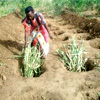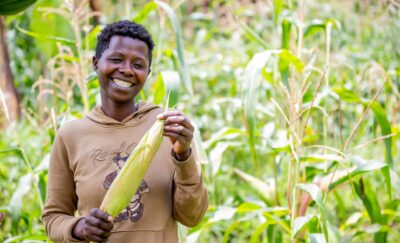News
10 August 2012
Invest in smallholder farming

Farm Africa urges Olympic Hunger Summit to invest in Africa’s smallholder farmers
Farm Africa has urged delegates gathered in London for this Sunday’s Hunger Summit to recognise the critical importance of investment in smallholder farmers for ending hunger in Africa.
Hunger kills more people each year than AIDS, TB and Malaria combined. 75 per cent of sub-Saharan Africa’s poor live in rural areas and are dependent on the food they grow and the livestock they keep to feed themselves.
Lack of investment
But this dependence on agriculture has not been reflected in state investment. Commitments made under the Maputo Declaration, when African countries agreed to allocate at least 10% of their national budgets to agricultural development, are still to be honoured by many countries. This lack of investment in agriculture and smallholder farming is holding back food production and will increase hunger in the region.
%smartmod-embedded-14-WIDTH%
Watch a video of British Prime Minister David Cameron and Olympics star Mo Farah urging leaders at the Olympics Hunger Summit to make tackling hunger a priority.
Rising food prices and dependence on food imports
Reduced food production is also increasing African’s dependency on costly food imports to an alarming degree. This dependence has been made worse by rocketing world food prices. East Africa’s net food imports have increased by 24% per year between 2003 and 2008. The case for investment in African smallholder farmers to increase their own productivity and to lessen dependence on food imports has never been clearer.
Why investment in Africa’s smallholder farmers works
For over 25 years Farm Africa has been listening to local people in eastern Africa and finding practical solutions to the problems limiting their ability to grow more food. Farm Africa knows that investing in simple agricultural solutions like providing appropriate seeds, tools and training at the right time, can move farmers from food dependency to self sufficiency.
Small Investments: big change
The introduction of dryland farming practices in the semi-arid Kitui district of eastern Kenya has shown harvest increased five times those possible by traditional farming methods. This is an area which has repeatedly suffered from food shortages and where USAID is predicting a “crisis” state between July and September this year.
David Kitua, a local farmer from Kitui district has benefitted from being taught how to farm his land to adapt to the arid conditions and is now self sufficient “With the money from my crop sales I am able to feed my family. I am also able to pay school fees for my son in secondary school and save money to pay the school fees for my second son. At a time like this, most households are depending on food aid, I am in a position to feed my family.”
Read an article in The Guardian which calls on leaders to put African smallholder farmers at the centre of national food security strategies.




